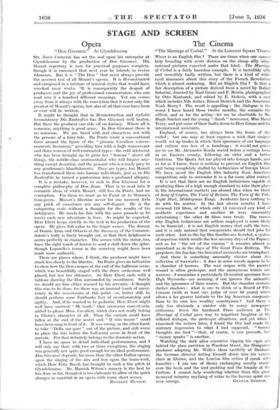STAGE AND SCREEN Opera
"Don Giovanni." At Glyndebourne
Mn. JOHN CHRISTIE has set the seal upon his enterprise at Glyndebourne by the production of Don Giovanni. His Mozart repertory is now for practical purposes complete, though it is rumoured that next year he intends to revive Idomeneo. But it is "The Don" that must always provide the severest test of all Mozart's operas. It is ill-constructed and composed in a mixture of musical styles that would have wrecked most works. it is consequently the despair of producers and the joy of professional commentators who can read into it a hundred different meanings. Yet one comes away from it always with the conviction that it is not only the greatest of Mozart's operas, but also of all that ever have been or ever will be written.
It might be thought that in ill-construction and stylistic inconsistency Die Zauber115:e has Don Giovanni well beaten. But there the producer can ride off on fantasy. Where all is nonsense, anything is good sense. In Don Giovanni there is no nonsense. We are faced with real characters, not with the persons of a fairy-tale. Da Ponte- wrote a conventional farce around the figure of the " giovane Cavaliere estrem- niamente licenzioso," providing hint with a buffo manservant and three women of well-contrasted types—the cold aristocrat who has been brought up to prize her " honour " above all things, the middle-class sentimentalist who will forgive any- thing except desertion, and the peasant who is a ready prey to any gentleman's blandishments. They are types, but Mozart has transformed them into human individuals, just as in Die Zauberfl ate he turned a pantomime into a profound allegory.
It is a mistake, however, to seek in Don Giovanni for a complete philosophy of Don Juan. That is to read into it romantic ideas of which Mozart, still less da Porte, had no conception. For them we must go to Faust or to Strauss's tone-poem. Mozart's libertine never for one moment feels any prick of conscience nor any self-disgust. He is the conquering male without a thought for the results of his indulgence. He meets his fate with the same panache as he meets each new adventure in love. As might be expected, Herr Ebert keeps strictly to the text in his production of the opera. He gives full value to the tragic scenes. The dismay of Donna Anna and Ottavio at the discovery of the Conunen- datore's body is finely brought out, so that their helplessness seems perfectly in character. The scenes with the statue, too, have the right touch of horror to send a chill down the spine, though Leporello's terror in the cemetery might have been made more authentic.
There are places where, I think, the producer might have stuck less closely to the libretto. Da Ponte gives no indication to show how the Don escapes at the end of the ballroom scene, which was beautifully staged with the three orchestras well placed, but not too obtrusive. So Herr Ebert ends with a tableau showing the Don surrounded by swordsmen. Surely we should see him either rescued by his servants—I thought this was to be done, for there was an unusual touch of uncer- tainty in the movements at this point—or, better still, he should perform some Fairbanks feat of swordsmanship and agility. And, if he wanted to be pedantic, Herr Ebert might well have omitted " Mi tradi," that enormous concert-aria, added to please Mine. Cavalieri, which does not really belong to Elvim's character at all. Then the curtain could have fallen at the end of the sextet and "II rid° tesoro " could have been sung in front of it. It was wrong, on the other hand, to take "Della sun pace" out of the picture, and still worse to place the trio before the ball-room scene in front of the curtain. For that definitely belongs to the dramatic action.
I have no space to detail individual performances, and I will only say that, with two or three exceptions, the singing was generally not quite good enough for an ideal performance. Don Giovanni depends, far more than the other Italian operas, upon the singing of the airs and less upon the team-work, which Herr Fritz Busch has brought to such a fine pitch at Glyndebourne. Mr. Hamish Wilson's scenery is the best he has done :so far, though it is too elaborate to allow of the quick changes so essential in an opera with many short scenes.
DYNELEY HUSSEY;














































 Previous page
Previous page